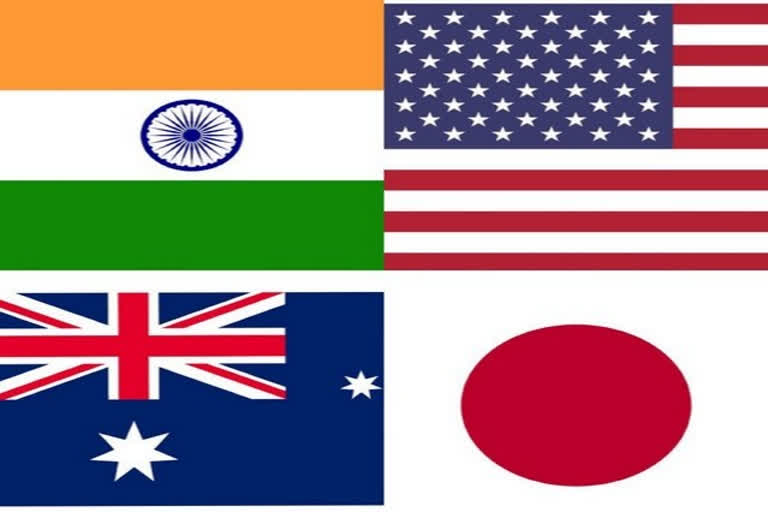New Delhi: Belying huge expectations of the shaping of a new military-strategic front like NATO that is poised to take on a growing China, a big take-away from the first ‘Quad’ summit held virtually on Friday is the fact that it is a much watered-down entity, going by what Jake Sullivan, US National Security Adviser (NSA), said in a White House briefing on Friday.
In response to a query, Sullivan was pretty upfront: “Quad is not a military alliance; it’s not a new NATO, despite some of the propaganda that’s out there. What it is, is an opportunity for these four democracies to work as a group, and also with other countries, on fundamental issues of economics, technology, climate, and security.”
“So I’m not going to get into detail on what the elements of that security will look like because we have work to do as an emergent institution to define what the agenda looks like.”
Also Read: Quad to tackle challenges together for free Indo-Pacific region: Biden
“What we know is that broad-based maritime security is already core to the Quad agenda, that humanitarian assistance and disaster response and the work of our militaries in that space is already on the agenda. Where we go from there on everything from freedom of navigation to broader regional security questions, that has to be worked through, not just at the leaders level but at the working level as well,” the US NSA added.
Upcoming Anchorage Talks
Sullivan’s tone and tenor are significant in the backdrop of the fact that the US, quite unexpectedly, has invited China for high-level strategic talks on March 18-19 in Anchorage, Alaska.
The meeting will be attended by Yang Jiechi, China’s senior-most diplomat, foreign minister Wang Yi, while the US will be represented by US Secretary of State Antony Blinken and Sullivan.
What unfolds in Anchorage will also determine the course Quad takes. US defence secretary Lloyd Austin is likely to carry a brief on this when he visits New Delhi on March 20, the very next day after the Anchorage meet. Before India, Austin would have travelled to Japan and South Korea.
The developments are yet another signal of President Biden trying to systematically undo what his predecessor Donald Trump intended to do including to erect a Quad with an avowedly anti-China focus and leave it as his prime legacy.
In Trump’s scheme of things, the role of NATO—originally erected to counter a Soviet Russia—would be much diluted with the US foreign policy primarily focused on China.
ALSO READ: Geopolitical experts hail timing of maiden Quad leaders' level summit
On the other hand, President Biden seems keen to consolidate the US and the West’s power and presence in the Indo-Pacific region by leaning on the traditional architecture of ASEAN. Or taking one step further in dismantling Trump’s position on China, Biden may in fact opt to resurrect the Trans-Pacific Partnership Agreement (TTPA).
In that case, Quad would at best remain to be what the US perhaps is pitching for—a platform to respond to and to counter natural or man-made disasters like the devastating Tsunami of 2004 or the COVID 19 pandemic that is currently in global rampage.
Indian Dilemma
Softening the tough position of the US on China in smaller or greater measure would land India in a strategic dilemma. From 2017 onwards, India had invested heavily on the Quad and had majorly backed the US in many initiatives including the American position in West Asia, losing out on a traditional friend in Iran in the process.
India’s strong backing of the Quad effort has put it in a difficult spot with Russia, undoubtedly one of India’s strongest friends in the recent past.
Very soon, therefore, India may have to take the final stand on its diplomacy and strategy — whether it would prioritise Quad over two other key multilateral platforms— the SCO and BRICS — where India is an active member along with Russia and China among others. Notably, India is hosting the BRICS summit this year.
The state-owned China mouthpiece ‘Global Times’ sounded out on Friday: “With India moving closer to the US, as well as its own anti-China stance in recent years, it's fair to say that BRICS and the SCO have fallen into stagnation since the Doklam standoff in 2017… On the other hand, India has attached more importance to Quad, and is very sure about its core demands of the US’ Indo-Pacific Strategy — to counterbalance, contain and deter China.”
But for whatever it is worth, 2021 may well be the year that India’s policy of “strategic autonomy” went for a toss.
Also Read: Not just Quad but other global powers too will join hands to counter China: Expert



